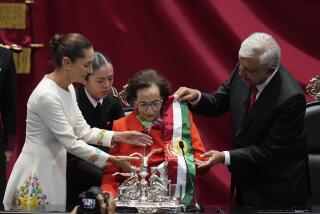The Invisible Women Behind Chavez’s Throne
Each spring, Californians pay homage to a fallen hero: Cesar Chavez, a man who gave life and form to the farm workers movement. Although I welcome the speeches and fiestas honoring Chavez, I deplore the lack of understanding of what women contributed to the United Farm Workers, a thing recognized by the eloquent Chavez.
Little is known of women’s activism in the UFW. And yet, was not the farm workers movement a family thing? Were not women such as Helen Chavez (Cesar’s wife, who held the family together) and Dolores Huerta (chief negotiator and co-founder) equally responsible for its success? Why little mention of las mujeres, the women, who led the grape boycott and kept the home fires burning?
When teaching Chicano history, I focus on the women’s contributions to the UFW. Most history books (even those by Chicanos) rarely cite the work of esposas, hijas, hermanas, mamas and tias who made the grape boycott a success.
In the early 1960s, when Cesar began to organize fieldworkers in the San Joaquin Valley, Helen Fabela Chavez was at his side. At that time, wages for farm workers were meager; working conditions were like those in the Third World. Housing, as described by Ernesto Galarza in “Spiders in the House & Workers in the Field,” lacked sanitation, potable water and heat. Women like Helen Chavez worked the double day. They toiled in the fields, then at home eked out meals of beans and tortillas for their families.
At night Helen Chavez worked on union business: attended meetings, registered workers and kept dinner waiting. She became union bookkeeper, a job thrust upon her (which she disdained but excelled at) and went on to manage the UFW credit union, a full-time job that precipitated her leaving the fields. She mothered seven children. Without Helen at his side, Cesar Chavez could not have fulfilled his dream of a union to serve farm laborers.
Dolores Huerta was equally important to the unionization effort. Although her role was more visible, she, too, worked long hours alongside the indefatigable Cesar. She possessed the education and language skills that proved crucial to the UFW. She organized voter registration drives and taught citizenship classes.
During the grape boycott in New York (led by Huerta) women were forced to relocate; the men stayed behind. At that time, the union had little money. Organizers lived in substandard housing; the cold was unbearable, as was the lack of adequate clothing. Often their children went hungry. Yet they persevered. With their children at their sides, mothers passed out leaflets, picketed markets where grapes were sold and, in general, made the presence--and goals--of the union known. Many were booed, taunted and assaulted outright.
*
Historian Margaret Rose’s study of UFW huelga (strike) women found that their participation has been invisible to the public at large. UFW women helped in traditional and nontraditional ways. And when it came to negotiating union contracts, none held a candle to Dolores Huerta, considered the most articulate in the group.
According to Rose, co-director of the California History Social Science Project at UC Santa Barbara, Chavez left the negotiations to Huerta. Like Emma Tenayuca, the formidable--and pretty--Mexican American woman who in 1938 organized pecan shellers in Texas, Huerta proved a formidable opponent.
And so, as we again honor Chavez, let us pause for a minute to also remember the women behind Cesar’s throne. They, too, deserve recognition.


